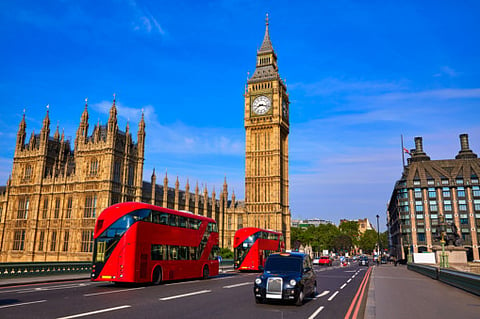UK-GCC free trade deal nears finish line, promises $10.8b boost to two-way trade
Talks launched in 2022 to conclude soon, with expected boost to trade, jobs, investment

Dubai: The United Kingdom and the Gulf Cooperation Council (GCC) are in the final stages of negotiating a Free Trade Agreement (FTA), a deal first launched in June 2022.
When signed, it would mark the UK’s first such agreement with the GCC bloc, which includes Bahrain, Kuwait, Oman, Qatar, Saudi Arabia, and the United Arab Emirates.
The proposed FTA is expected to deepen strategic and economic ties between the UK and Gulf states and expand trade in key sectors such as energy, manufacturing, and services. Negotiators have made notable progress on areas including goods, services, and sustainability, according to recent UK government statements.
What do FTA agreements entail?
A free trade agreement (FTA) usually entails a legally binding pact between two or more countries aimed at reducing or eliminating barriers to trade. These barriers can include tariffs (taxes on imports) and non-tariff barriers like import quotas and complex regulations. FTAs facilitate increased trade and economic cooperation by creating more favorable conditions for cross-border trade.
UK looks to GCC for recovery
Amid economic headwinds—including slow growth, a weak currency, and political instability—the UK sees the GCC as a critical trade and investment partner. The country’s economy stagnated in Q3 2024 and grew just 1.6% by IMF estimates for 2025.
The UK government projects that the FTA could increase bilateral trade by up to 16%, adding approximately $10.85 billion annually. It could also boost GDP by up to £3.1 billion and increase workers’ wages by as much as £1.1 billion by 2035.
Currently, UK-GCC trade stands at around $72.4 billion, with the GCC being the UK’s fourth-largest trading partner. Trade with the UAE alone reached £23.4 billion by Q3 2024, making it the UK’s 19th largest partner.
UAE and UK deepen bilateral ties
Over 5,000 UK companies currently operate in the UAE, and Britain is the UAE’s top source of foreign direct investment. New business regulations in the UAE—such as allowing 100% foreign ownership in select sectors—are expected to enhance the impact of a future FTA.
Joint platforms like the UK-UAE Business Council and Joint Economic Committee have been driving bilateral engagement across health, education, technology, and renewable energy. These efforts are aligned with broader regional diversification goals in the Gulf.
Key elements of UK-GCC trade deal
The proposed FTA is expected to include:
Reduction or removal of tariffs on key exports and imports
Simplified customs procedures and regulatory alignment
Better access for businesses and investors in both regions
Opportunities for future bilateral deals with individual GCC countries
Gulf states are targeting growth in industries such as artificial intelligence, digitisation, and clean energy—areas where UK firms are well positioned. For GCC investors, the deal offers better access to UK markets and strategic sectors like critical minerals, fintech, and advanced manufacturing.
Long-term impact
Despite delays caused by internal challenges and the complexity of aligning interests across six GCC nations, momentum is building. UK officials, including Prime Minister Keir Starmer and Trade Secretary Jonathan Reynolds, have prioritised the region with multiple high-level visits in recent months.
A finalised FTA could signal stronger political and economic alignment between the UK and the Gulf at a time when both seek to strengthen their global standing and reduce reliance on legacy trade partners.
While no exact date has been confirmed, both sides expect to conclude negotiations by the end of 2025. When successful, the UK-GCC FTA will likely unlock a new chapter of cross-regional investment and trade growth.
Sign up for the Daily Briefing
Get the latest news and updates straight to your inbox


